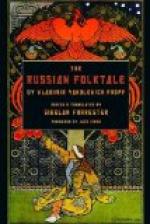Once did I catch a tailor
proud
Heavy he was as elder
wood,
From Heaven above he’d
run a race,
With an old straw hat
to this place,
In Heaven he might have
stayed no doubt,
For no one wished to
turn him out.
He fell in my web, hung
in a knot,
Could not get out, I
liked it not,
That e’en the
straw hat, safe and sound,
Nine days ere him came
to the ground.
A delightful little rhyme, Tom Thumb, is among
Halliwell’s Nursery
Rhymes. It may refer to the Danish History
of Tom Thumb:
I had a little husband
No bigger than my thumb;
I put him in a pint
pot
And there I bade him
drum:
I bridled him and saddled
him,
And sent him out of
town;
I gave him a pair of
garters
To tie up his little
hose;
And a little handkerchief
To wipe his little nose.
The English version of Tom Thumb as we know it today, opens with a visit of the magician Merlin at the cottage of an honest and hospitable ploughman. Merlin rewarded the Goodman and his Wife for their hospitality by calling on the Queen of the fairies, who brought to the home, Tom Thumb, a boy no bigger than a man’s thumb.
The time of the tale is in the days of Merlin and King Arthur’s court. The tale is marked by a number of distinct English elements. The introduction of the Queen of the Fairies, of Fairy Land and the visit there, and of the fairy clothes they make for Tom, are all decidedly English. The sly ways of Tom, his tricks and his cleverness are distinctly English humor. He played with the boys for cherry-stones, and took theirs. He had so much curiosity that he fell into his mother’s pudding. He was so light that on a windy day he had to be tied to a thistle when his mother went to milk the cow; and so, with his oak-leaf hat, he got caught in the cow’s one mouthful. After other strange adventures he arrived at King Arthur’s court where he became the favorite. His feats at tilts and tournaments give a glimpse of English court life, with its pastime of hunting; and fighting with the sword brings in the knight element. The story has little plot, being a succession of many episodes and a repetition of some. It shows little constructive ability, promises to be a perpetual tale, and is ended only by sudden death at the poisonous breath of the spider. Tom Thumb is one of the tales of pure fancy, with no underlying meaning, created for pure entertainment, to please children and grown-ups by its little people and little things. The moral is in the effect of Tom’s character.




